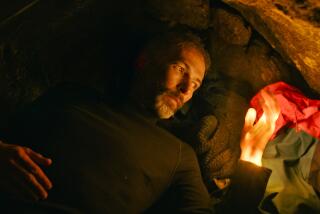Movie Reviews : Sylvain Sleeps to Conquer in ‘Light Years’
- Share via
‘Light Years,” a new French film at the Nuart and Rialto theaters through Saturday, accomplishes something no other animated feature has done: It makes Saturday-morning kidvid look good.
It’s difficult to know just where to assign the blame, as the credits list five directors, a technical director, four creative consultants, a creator-animator, a writer-adapter who works only in English and an “original screenplay translator.” Despite this plethora of leaders, “Light Years” has no direction, no focus and no coherent story line.
The action takes place on the peaceful planet of Gandahar: We know it’s peaceful because we see a lot of bare-breasted natives picking fruit, tending their flocks and breast-feeding weird little animals. This pastoral idyll is shattered when a troop of nasty black robots attacks, zapping the natives into statues with their ray guns.
The heroic Sylvain is sent to fight the attackers single-handed. When he learns that the robots have come from the future, he goes to sleep for 1,000 years--so he can counterattack after they’ve conquered Gandahar: The only way to prevent the invasion from starting is to stop it after it’s ended. (Got that?)
The animation doesn’t even approach the level of a student film. The artists can’t keep the proportions of the characters consistent from scene to scene, and several Saturday-morning programs boast flashier effects than the wimpy explosions in the battle sequence.
Some big-name talents provide the voices, including Glenn Close, Christopher Plummer, David Johansen and magicians Penn & Teller. Their performances are disappointingly flat, although no actor could be expected to give credible readings of howlers like “Out of pride and ignorance, we forged a Deadly Evil!” Was this drivel really written by Isaac Asimov--who dealt so thoughtfully with the paradoxes of time travel in the novel “The End of Eternity?”
“Light Years” is too minor a disaster to ruin many reputations, with the possible exception of “creator-animator” Rene Laloux. His most famous film, “Fantastic Planet” (1972), has a fervent cult following, but even his most rabid fans will have trouble forgiving this muddled flop.
More to Read
Only good movies
Get the Indie Focus newsletter, Mark Olsen's weekly guide to the world of cinema.
You may occasionally receive promotional content from the Los Angeles Times.








